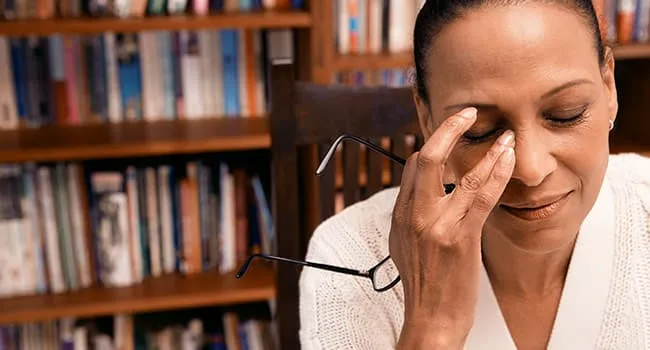
If you're going through menopause, have you noticed that along with the hot flashes, night sweats, and mood changes, you also feel a lot more pain? It's not just your imagination. A new study has found that women with menopause symptoms are nearly twice as likely to have chronic pain diagnoses, such as fibromyalgia, migraine, and back pain.
"Chronic pain is a huge issue across the United States, but not a lot of attention is paid to the fact that it's particularly acute for women in midlife," says author Carolyn Gibson, PhD, a clinical research psychologist with the San Francisco VA Medical Center.
She analyzed the medical records of more than 200,000 female military veterans for the study, published in Menopause: The Journal of The North American Menopause Society (NAMS). "Many women are having a tough time in menopause, and we found that those most affected by those symptoms were far more likely to have chronic pain."
The relationship between menopause and increased pain levels is not well understood, says NAMS executive director JoAnn Pinkerton, MD, a professor of obstetrics and gynecology and director of midlife health at the University of Virginia Health System. "Estrogen and other hormones have complex interactions with pain sensitivity," she says. "But whether you're developing a chronic pain condition for the first time or having flares of a pre-existing condition, these changing hormone levels affect both the symptoms of chronic pain and how you experience it."
Other symptoms and "side effects" of menopause may also worsen chronic pain, including:
- Weight gain
- Sleep disruption
- Mood disturbances, such as depression and crankiness
This increase in chronic pain puts women in menopause at risk for dependency on pain medications such as opioids, says Pinkerton. She advises women to seek care from a team of experts that includes a menopause specialist who understands the effect of hormonal fluctuations on pain conditions and avoids opioids.
"They should focus on other therapies like nonsteroidal anti-inflammatory drugs, heat treatment, electronic stimulation, and prescription drugs like gabapentin (Neurontin), which interferes with pain reception but is not addictive," she says.
"Don't suffer in silence," says Gibson. "Even if the symptoms can't be completely fixed, they can still be made much better." About 42% of women in a national survey say they've never discussed menopausal symptoms with a doctor. Choose to speak up.
4 Tips
Pinkerton suggests ways to manage chronic pain in menopause:
- Practice relaxation techniques. Try yoga and mindfulness meditation.
- Stay active. "Even on the days you have pain, set minimal goals for activity, like walking 3,000 steps each day," Pinkerton says. "If you sit on the couch, you become deconditioned and the pain gets worse."
- Say no sometimes. Stress increases your perception of pain. It's OK to say no to this committee or that extra project if it will add unnecessary stress.
- Protect your sleep. Lack of sleep makes pain seem worse, and research has found that making sleep a priority leads to longer and better sleep even for those with chronic pain. Limit caffeine and alcohol in the evening, turn off those glowing screens, and keep the bedroom cool and dark.
Find more articles, browse back issues, and read the current issue of WebMD Magazine.

